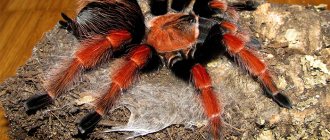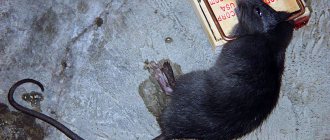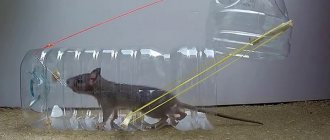Mice live next to the man of the millennium. Many ingenious and dangerous methods have been invented in the fight against “uninvited guests.” But as soon as autumn approaches, you hear the patter of little paws, squeaking, and rustling. They not only create an unpleasant smell in the house, but also chewed things and spoiled food.
Mice live next to the man of the millennium. Many ingenious and dangerous methods have been invented in the fight against “uninvited guests.” But as soon as autumn approaches, you hear the patter of little paws, squeaking, and rustling. They not only create an unpleasant smell in the house, but also chewed things and spoiled food. Of course, you can use poisons and mousetraps, or you should try more humane means, for example, repelling with odors. These are proven, folk methods, thanks to which rodents leave a person’s home and rarely return to it.
What sounds scare mice?
Rodent repeller devices are very popular now. There are more than enough options and all kinds of modifications. But besides the frequency oscillations emitted by the device, mice are afraid of other sounds:
- quiet ones, which are created by their natural enemies, quietly creeping up on their prey;
- loud sounds made by people (screaming, music) or falling objects;
- strangers, if the animal does not know how to react to them;
- emitted by the mice themselves when they warn of danger, are afraid or fight in their death throes.
Note: The sounds that come from rodents are not audible to humans, since their frequency is up to 70 kHz. That's why they are called ultrasound: they are inaccessible to the human ear. They are what are used in devices.
There are ultrasonic frequencies that animals do not care about and that frighten them. Therefore, the task of the devices is to generate sound in the required range. Mice begin to panic when the device is operated in the following ranges:
- 25-28 kHz - the mouse is in pain and screams,
- 32-33 kHz - danger signal emitted by the animal,
- 35-60 kHz - squeak, expressing discomfort.
It is difficult to guess at what frequency a device must operate for a rodent to be afraid of it. Over time, he will get used to the same type of signal. In modern repellers, frequencies periodically change. Moreover, this is done in random mode, so the mouse cannot get used to the sound.
Article on the topic: Ultrasonic mouse repellers
This is the best way to get rid of a family of mice in a small house. I installed the repeller, plugged it in and forgot about it. There is no need to set traps or poison animals. Everything is simple, convenient and accessible. The main advantages of ultrasonic “saviors”:
- ultrasonic waves affect all mouse droppings, so they leave their homes in full force,
- rodents do not die, which avoids unpleasant odors of decay,
- devices operate in the desired rhythm and mode and do not need adjustment,
- the repeller consumes a minimum of electricity,
- The warranty period is 10 years.
Is it possible to use a phone or computer as a mouse repellent? This idea has been used more than once in attempts to record the required sound on an electronic device. But the speakers are designed to reproduce sounds accessible to humans, not rodents. So this idea turned out to be useless.
Note: Some people try to scare away animals using cruel methods. They nail a live mouse to the wall of the barn and it “screams”, scaring its relatives. The same effect is achieved by burning a live rodent. But this method does not last long. A little time passes and the mouse hordes return.
How to get rid of mice in an apartment forever?
Doing this quickly is not always possible. Mice and rats are cunning and dexterous rodents, so you need to be patient to deal with them. In addition, the number of one colony sometimes reaches 120-150 individuals - coping with such a number of rodents quickly is quite a difficult task.
You can resort to traditional methods, which we will talk about later, or you can use modern methods - as they say, to your taste.
Ultrasonic repellers
This is something that is not audible to the human ear, but can cause severe anxiety for rodents - to the point that they leave the place where there is this kind of irritant. There is nowhere to hide from it - invisible waves fill the entire space, being a “headache” for mice, disrupting their life cycle and reproduction. For animals, this becomes a significant reason to leave the room to which they will never return - mice have long-term memory and are unlikely to want to live in a place where they were constantly disturbed by ultrasound in the future.
Models of devices are provided for both large rooms and smaller rooms - usually the manufacturer declares efficiency for the maximum area - in reality it can differ by 20%. To completely eliminate rodents, it is necessary for the device to operate continuously for about 7 days.
They can be used to expel rodents from the apartment and to prevent their unwanted appearance. Highlight:
Folk remedies
Among the folk methods of control there is gypsum, which is mixed with flour in equal parts and placed in different containers, which are then placed in places where rodents accumulate or near their burrows. It is necessary to leave water for the mice near these containers, since the eaten mixture of flour and alabaster will inevitably make the animals thirsty. Water will cause the plaster to harden, causing the death of the pest. The method has a great advantage over chemical mixtures - it will not cause poisoning by accidentally getting on food, and will not poison pets who may eat the mixture or a poisoned mouse.
Also an effective remedy for mice is ash - more precisely, the alkali it contains, which can cause inflammatory processes on the paws, and then in the mouth of the rodent. Broken glass also has a damaging effect - the main thing is that the fragments are small.
Traps and mousetraps
Mousetraps are a method that has long been popular. However, if there are too many rodents in the room, one such trap may not be enough, so it is better to install several mousetraps in different rooms. For better effectiveness, use pieces of food that emit odors that attract rodents - sausage, bread, lard. Today, electric mousetraps have been developed - the high-voltage discharge of which instantly kills the animal.
Glue - the essence of its work is to immobilize an animal that falls on cardboard or plywood with a composition applied to it. The glued animal cannot leave, and sometimes several rodents fall into this trap at once. A small drawback of such a fight is the squeaking and “fussing” that the animal can make in an attempt to come unglued and run away.
An example of such a trap is the Medilis glue trap (detailed characteristics and method of use can be found here). This is an effective rodent control product with a non-toxic sticky composition. The trap should be placed in a place where rodents constantly move and left for 1-2 days. In this case, the area of the premises should be taken into account - calculation - 1 trap per 10 sq. m. After a couple of days, the traps must be inspected - they may either have animals attached to them, or be contaminated with dust - in both cases they become unsuitable for further use. It is important that other pets do not fall into such a trap - it is better to temporarily transport the animal. Although the drug has low toxicity, it is important to ensure that it does not get into the eyes - if this happens, be sure to rinse the mucous membranes with plenty of running water.
Professional pest control
Today, the total extermination of rodents in premises can be carried out with the help of special services that use professional means that are most effective in controlling rodents and minimally toxic to humans.
Professional help is sought when other methods have not proven effective, or there is simply no way to deal with the issues of eliminating mice. The method is paid - in different regions the price can reach from 3 thousand for a small room. But most often it justifies itself - deratization is carried out by specially trained people who know exactly where and how to spray the composition. Deratization can be a preventive measure, or it can be a necessary measure. After such treatment, rodents are guaranteed to leave the premises for up to 1 year - only in 2% of cases is repeated treatment required.
Plants in the fight against rodents
Mice have a well-developed sense of smell, so they react to any odors. Among them there are those that scare them away, causing disgust. Since ancient times, various herbs (dry, fresh, tinctures from them) have been used in the fight against “uninvited guests.” These pleasant-smelling “repellents” are completely safe for the inhabitants of the house.
Among the herbs that are most unpleasant to mice are:
- Chamomile, the flowers of which should be scattered in the places where the food is located (fresh or dry: it works equally well).
- Wild mint, which is laid out in bunches, after drying, in places where rodents gather. You can also use a tincture from it, lubricating the places where “furry guests” appear most often.
- Elderberry, the smell of which is especially unpleasant for animals. It is enough to lay out twigs with berries on the shelves of the kitchen cabinets, and the mice will stop rustling in the kitchen at night.
This is interesting: Rodents are so disgusted with elderberry that they avoid houses next to which this plant is planted. So, if you live in a private house, plant elderberries nearby and do not be afraid of a mouse invasion. Planting mint bushes in the backyard will also come in handy: mice will avoid them.
- Wormwood is a herb whose smell is quite pungent and is not liked not only by pests, but also by some people. Dry bunches of grass are laid out on kitchen shelves and in corners (or around the perimeter) of the house.
- Tansy also has a pungent odor, causing unpleasant emotions in “uninvited residents.” Bunches of dried grass are laid out around the house and not only mice, but also ants and flies leave it. By repelling mice, you will also get rid of other unpleasant inhabitants of the apartment.
- Ledum is a poisonous plant, but due to its high content of essential oils it can repel pests from a long distance. It is enough to lay out just a few bunches of wild rosemary in the apartment.
- Black root is poisonous not only to mice, but also to people, so it should be placed only in places where animals are frequented and used carefully, especially if there are children in the house.
- 8. Hazel grouse bulbs have a garlicky aroma and mice avoid it.
Important: It is advisable not to just lay out the bunches of herbs, but to first dip them in boiling water. So there will be a smell
the strongest and stay in the air longer. Place safe plants throughout the house, poisonous plants near mouse holes. The “poison” should be updated once a week.
You can try placing burdock in the holes. Gray pests do not like thorns; they avoid them. Therefore, they will not climb into the holes where the “spiny balls” are laid out. They will either leave, which is doubtful, or make new moves.
Folk remedies that remove mice from the house include ordinary stove ash. It is scattered on dry floors, in the cellar, and in other places where mouse paths pass. The ash contains alkali, which gets on the paws of mice and corrodes them. Mice lick it off, thereby causing irritation in the mouth and stomach. Small broken glass is used as a means of pest control. Mouse feet are delicate and splinters cause serious and painful injuries. Because of ash or broken glass, they may change their location.
Choosing an ultrasonic repellent device
The practice of fighters against rats and mice shows that repellers that cost more than 1,000 rubles work reliably. In the case of these devices, the price quite well reflects the level of quality: cheaper than 1000 rubles, they usually sell obvious junk, sometimes only simulating work by flashing LEDs.
Moreover, special tests were carried out on several dozen devices on basement and free-living rats in abandoned enterprises. It turned out that powerful and more or less reliable means that can repel pests are:
- Chiston 2 (its price is approximately 2,200 rubles);
- Chiston 2 PRO (costs about 2,500 rubles);
- Bioguard (4500 rubles);
- TM-315 (costs more than 10,000 rubles);
- WK-0600 (7500 rubles);
- UZU-03 (costs about 3,000 rubles);
- Spectrum (3500 rubles);
- Tornado 800 (popular device, price approximately 3,500 rubles);
- Tsunami-2 (the cheapest on the list, costs just under 2,000 rubles);
- KQ-202 A (about 8,000 rubles).
The photo below shows the Chiston 2 repeller:
And here is Tornado 800:
These devices are more likely to scare away rats from a large apartment or from a medium-sized private house, from a basement or technical room. However, even they sometimes do not give a visible effect.
On a note
You can also scare a rat using an ultrasonic dog shocker. However, you won’t be able to use this product all the time, since it drains the battery too quickly.
Sometimes devices from the Elektrokot, Grad, and Typhoon brands work, and sometimes they don’t help. They look effective in reviews on YouTube when the device is turned on directly in a mouse cage, but in a large house the power of the repeller may not be enough.
It is also useful to read: Poison from rats and mice Goliath and features of the use of this remedy
Help of essential oils in the fight against rodents
Knowing what smells mice don’t like, you can, if not get rid of them forever, then scare them away for a long time. Many herbs also contain essential oils, but their concentration in dry mixtures is not so high, and therefore the smell is rather weak.
The most effective essential oil with a sharp and persistent aroma that rodents do not like is peppermint oil. Before using it, you need to find holes or holes through which mice enter the house. It is these places that are subject to treatment, which is used in 2 options.
Option 1: Moisten several cotton pads or balls of cotton wool with a mixture of oils. We put the product in the hole and seal it with tape so that the smell does not penetrate into the apartment. The mixture contains: 50 ml. vegetable oil + 20 k. peppermint oil. This composition can be prepared in advance and stored in a tightly closed container.
Option 2: Pour the prepared mixture into a spray bottle, mix thoroughly (shake before use) and spray in the kitchen, along the baseboards, in places that rodents visit most often. The composition consists of 1-15 k essential oil + 300-400 ml. water + 10 ml. alcohol
Note: A one-time treatment will not help; it should be repeated several times. Essential oil will not kill mice, but will only repel them. But if it gets on the pest’s fur, it may die. Then you will find more than just essential oil aromas.
On the line of battle - spices and seasonings
Fighting mice with folk remedies is quite effective and safe. In addition, it brings certain results: if it does not destroy, it certainly repels pests. Among such means, spices and herbs occupy not the least place. They have a strong aroma (no worse than chemical protection), which rodents avoid.
The smell of coriander or cilantro causes the strongest dislike of mice. All you need to do is place cilantro seeds or powder in your kitchen cabinets and mice will stop eating your home food supplies. Sprinkle the powder in those places that furry pests visit most often.
Synthetic flavorings also help a lot in the fight against rodents. They can be bought in specialized stores or ordered online. For us they have a pleasant aroma, but for “furry guests” they do not. Their cost is more expensive than coriander, and the effect is quite strong.
Smells that mice try to avoid
If the premises are not residential (garage, barn, warehouse) or left for a long time, then removing mice from the house is a matter of technique. Like people, they have unpleasant odors:
- burnt rubber,
- burnt wool or fluff,
- kerosene,
- naphthalene,
- cheap Soviet-made perfumes.
In a residential apartment, such “aromas” will harm their inhabitants: harmful combustion decay products will enter the body. But if you enter your home every now and then, you can create a toxic atmosphere.
Important: When setting fire, to avoid poisoning, use gloves and a respirator. Do everything quickly, closing doors and windows. You can enter the room a few days after thorough ventilation.
There are smells that mice love and that can be used to lure them into a trap. For example, they are attracted to the smell of beer. The bottle needs to be placed at an angle and the neck needs to be “paved a path”. At night they will come for a beer, and in the morning you will find them in a bottle. Of course, not all at once, but several individuals will be caught. They will slide down the slippery neck and will not be able to get out. It's not as scary as glue, poison, mousetraps and other terrible devices.
What else are rats afraid of and how can you scare them away?
Of course, rats are afraid of more than just sounds. They, for example, also avoid many odors, and they also try to use this to get rid of annoying rodents.
For example, rats are known to be repelled by:
- Technical liquids with strong odors - gasoline, kerosene, turpentine, karbofos, vinegar, denatured alcohol;
- Aromas of certain herbs (for example, black root);
- Strong odors of perfumes, including essential oils.
However, there is a nuance - pests quickly get used to these products. For example, if today turpentine or camphor oil repels rats in the house, then after about a week the animals will be absolutely indifferent to it.
The main disadvantage of these products is that their smell in the house is clearly felt by humans. To prevent rats from daring to enter living quarters, there should be such a strong smell (in fact, stink) of gasoline or black root that people themselves will not be able to live in such conditions. That is why such means are rarely used: a sane person will not want to sacrifice comfort.
On a note
A cat is a good, but not always effective, home protector from rats. If she really is a rat catcher, then you will know about the presence of rodents only by the corpses that the pet will carry to you for praise. If the rats understand that the cat will not catch them (in fact, there are a lot of such cats), then they will boldly visit the home, no matter how strongly it smells of cat litter.
Biological control agents
We have known the fairy tale about what mice are afraid of since childhood. This, of course, is a treacherous cat who only thinks about how to eat the stupid mouse. Indeed, a young and fighting cat is able to cope with a large number of rodents. And if this predator lives in the house, then there is no reason to worry about a mouse invasion. She will catch a few victims, the rest will leave on their own. Interestingly, the cat usually does not eat the mouse, bringing the owner a trophy.
Statistics show that one cat catches up to 60 mice a year, keeping its territory under control. She is a lone hunter who goes through all the hunting rituals, tracking and catching a rodent. But the mustachioed predator can infect the owner with an allergy or infectious disease obtained from mice, for example, toxoplasmosis.
Note: If you take a predator from your neighbors to save you from rodents, of which you already have quite a lot, then it is not a fact that he is able to cope with them. The infestation of mice is “not something he can handle.” In addition, the animal should not be shy. Not all pets exhibit hunting instincts.
Other animals also hunt mice: dogs, ferrets, weasels, and some birds of prey. Your indoor dog, of course, will take part in catching rodents, but you can’t expect much help from other predators, because they hunt in natural conditions.
Squeak
With the help of a piercing loud squeak, the animal tries to convey its fear or pain. Inspect the area around the cage and analyze what might have frightened your pet. It is likely that the rat could hear the cat or the hum of the vacuum cleaner from the next room.
If the rat does not live alone in the cage, put it away. Inspect carefully for bites and injuries. If there are no visible signs of damage on the body, and the pet does not calm down and continues to squeak for a long time, contact your veterinarian immediately. Your pet may experience severe pain due to internal injuries.
A quiet, barely audible squeak from stroking means that the rodent enjoys communicating with the owner.
An abrupt loud squeak when pulled out of the cage signals that the pet is not in the mood to contact a person.
Prevention of mouse infestations
If you have gotten rid of rodents, there is no need to relax. They may visit your home again. Therefore, try to follow a number of simple rules:
- Store products in refrigerators or closed containers out of reach of mice.
- The apartment must be in immaculately clean condition.
- If the house (apartment) is old, then seal all the holes and openings so that “not a single mouse gets through.”
- Place wormwood, mint, or cotton balls soaked in essential oil in the corners.
- Get a mustachioed hunter cat.
Important: If you notice the smell or traces of mice, do not hesitate. You need to take action right away, since the females are very fertile and getting rid of a large mouse family will subsequently be much more difficult.
Sometimes mice cause us sympathy, because they are so cute and fluffy, they have funny habits. There are hobbyists who keep pet mice. But remember that they carry dangerous diseases such as tularemia, leptospirosis, salmonellosis and others. In addition, they need to constantly grind down their incisors, so mice chew on everything: furniture, wires, walls, floors. Their appearance in the house is associated with a lot of troubles. And the methods you just read about will allow you to get rid of “uninvited guests.”
If you find an error or inaccuracy, please select a piece of text and press Ctrl+Enter.











